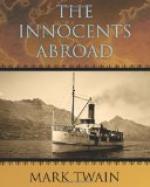After a while he brought a basin, some soap, and something that seemed to be the tail of a horse. He made up a prodigious quantity of soap-suds, deluged me with them from head to foot, without warning me to shut my eyes, and then swabbed me viciously with the horse-tail. Then he left me there, a snowy statue of lather, and went away. When I got tired of waiting I went and hunted him up. He was propped against the wall, in another room, asleep. I woke him. He was not disconcerted. He took me back and flooded me with hot water, then turbaned my head, swathed me with dry table-cloths, and conducted me to a latticed chicken-coop in one of the galleries, and pointed to one of those Arkansas beds. I mounted it, and vaguely expected the odors of Araby a gain. They did not come.
The blank, unornamented coop had nothing about it of that oriental voluptuousness one reads of so much. It was more suggestive of the county hospital than any thing else. The skinny servitor brought a narghili, and I got him to take it out again without wasting any time about it. Then he brought the world-renowned Turkish coffee that poets have sung so rapturously for many generations, and I seized upon it as the last hope that was left of my old dreams of Eastern luxury. It was another fraud. Of all the unchristian beverages that ever passed my lips, Turkish coffee is the worst. The cup is small, it is smeared with grounds; the coffee is black, thick, unsavory of smell, and execrable in taste. The bottom of the cup has a muddy sediment in it half an inch deep. This goes down your throat, and portions of it lodge by the way, and produce a tickling aggravation that keeps you barking and coughing for an hour.
Here endeth my experience of the celebrated Turkish bath, and here also endeth my dream of the bliss the mortal revels in who passes through it. It is a malignant swindle. The man who enjoys it is qualified to enjoy any thing that is repulsive to sight or sense, and he that can invest it with a charm of poetry is able to do the same with any thing else in the world that is tedious, and wretched, and dismal, and nasty.
CHAPTER XXXV.
We left a dozen passengers in Constantinople, and sailed through the beautiful Bosporus and far up into the Black Sea. We left them in the clutches of the celebrated Turkish guide, “Far-away Moses,” who will seduce them into buying a ship-load of ottar of roses, splendid Turkish vestments, and ail manner of curious things they can never have any use for. Murray’s invaluable guide-books have mentioned ‘Far-away Moses’ name, and he is a made man. He rejoices daily in the fact that he is a recognized celebrity. However, we can not alter our established customs to please the whims of guides; we can not show partialities this late in the day. Therefore, ignoring this fellow’s brilliant fame, and ignoring the fanciful name he




